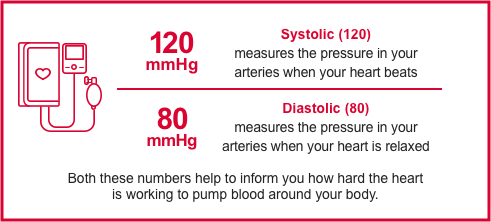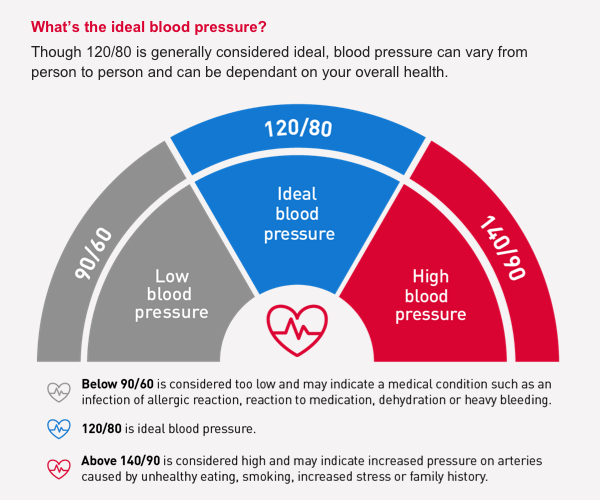
Chances are you’re doing your best to exercise regularly and keep to a healthy diet and all up are feeling pretty good – so why would you worry about getting your blood pressure checked?
You probably already know that high blood pressure (hypertension) increases your risk of serious diseases like stroke or heart attack, but what you may not know is that most of the time there are no signs or symptoms of high blood pressure. That means you can feel good and still have high blood pressure. The only way to know if you have high blood pressure is to get it checked professionally.
Many Australians suffer from high blood pressure, so if you haven’t had your blood pressure checked lately, it’s a good idea to add it to your to-do list.
But what numbers should you aim for? What’s a healthy blood pressure, and what’s not? Let’s start with the basics.
What is blood pressure?
Blood pressure measures the amount of pressure placed on your heart to circulate blood throughout the body. It’s usually expressed through two numbers:


Together, these numbers help to inform you how hard the heart is working to pump blood around your body.
Why should I know my blood pressure?
Blood pressure is an essential measure in determining heart health. If your blood pressure is high, it may be due to lifestyle factors or it may also indicate health issues such as heart and kidney disease, strokes or circulation issues.
Remember that this is true even if you lead a fit and healthy life. You might not know if your blood pressure is too low or too high unless it’s properly checked. It’s one of the reasons why hypertension is sometimes referred to as the No. 1 silent killer.
What should my blood pressure be?
Though blood pressure varies from person to person, there are some ideal numbers to aim for.


There are numerous risk factors that can contribute to high blood pressure:
- Family history
- Unhealthy weight
- Smoking
- Alcohol intake
- High cholesterol
- Stress
How often should I get my blood pressure checked?
You should get your blood pressure checked at least once every two years, or as often as your GP recommends if you have ongoing health issues, live with any of the above risk factors, or are pregnant.
If your numbers are too high, the good news is that almost half of people with high blood pressure can make lifestyle changes to lower it. These lifestyle changes include:
- Regular physical activity
- Losing weight
- Quitting smoking
- Eating healthily
- Reducing alcohol consumption
- Managing stress
A healthy lifestyle that includes regular exercise and a BP-friendly diet and limits alcohol is one of the best ways to control your blood pressure. Keep in mind that hypertension alone increases the risk of heart disease, kidney disease and stroke; but when it’s combined with one or more of smoking, diabetes and high cholesterol it can pose even more of a threat to your health. Managing your stress levels can also help: there are several techniques you can try, including mindfulness, which you can also do with the help of an app like Smiling Mind.
Talk to your GP before starting a new exercise program, and to discuss support options that can help you make these changes.
There are also prescription medicines called antihypertensive medications that can help lower blood pressure: your doctor will assess whether these are an option for you.
Check your blood pressure at your GP or local participating pharmacy
If you don’t already know your blood pressure, book in with your GP to get it checked. Some pharmacies offer this service too, including our partner Amcal. Use their store locator to find one near you, and please make sure to let your GP know your results.
For information on minimising the risk of cardiovascular disease, visit our healthy heart page.
Reach out if you need a hand
If you have any questions about your health, Members with health insurance can call Medibank 24/7 Nurse Support, to chat with a registered nurse or 24/7 Medibank Mental Health Support for mental health and wellbeing support.~
